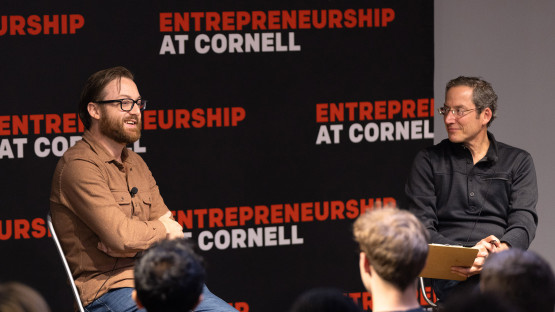After spending 10 years at software powerhouse Palantir, Brian Schimpf ’07 was ready to take a leap to create a new company, Anduril, with co-founders, including Palmer Luckey, inventor of the virtual reality headset Oculus Rift.
Today, Anduril has 15 business lines creating everything from surveillance and attack drones to autonomous fighter jets and sensors to go into space. With revenue in the low billions, it will end the year with 7,000 employees, Schimpf said.
Schimpf spoke to a packed house of nearly 150 at eHub in Collegetown Nov. 12 at an event hosted by Entrepreneurship at Cornell.
“This company was teed up to be a monster – we had an experienced and ambitious founding team with a huge ability to line up capital,” he said about his decision to join the startup. “How many potential opportunities will I get like that? Plus, I think this risk thing is massively overwrought. Let’s say you start a company and it doesn’t work out. How long will you be unemployed: hours or minutes? It’s an ego risk, but not a financial risk.”
Schimpf said his time at Palantir prepared him well to take on the CEO role at Anduril. An early hire on the custom engineering team at Palantir, Schimp quickly moved up, learning “it turns out I had an aptitude for the management and strategy side, and I eventually took over product as well,” he said.
The key to managing a company in the midst of hyper growth, he said, is to accept you are constantly going to be in a mode of change. “I just had to figure out my job when I showed up every day. I knew that our organization would look different every year.”
The company’s customized software process meant that teams of five to six Palantir engineers embedded with a customer for six months, deploying early-stage products to see if they were successful, then reworking those products until they were perfect.
“I developed an understanding of what hyper growth looks like and how to scale a company through thousands of people,” Schimpf said. “I also had a huge amount of exposure to the business and sales side, so I understood how sales happen and all of these ancillary functions you need to have.”
Schimpf also learned how to build and motivate a team, he said: “good people do well if you give them hard, ambitious stuff to do.” Those skills translated well as he grew the team at Anduril.
Because of Anduril’s leadership team and its product potential, it had no problem attracting investors, Schimpf said. “Once you’re a Tier 1 company, you have unlimited investor demand,” he said. “If your company is doing well, no investor will give you a hard time.”
Company leaders thought it would take five to six years to get most of their products off the ground, but things have moved way faster, Schimpf said. Part of that momentum has been the state of conflict in the world, he said.
“A decade ago, nobody ever believed there would be state-on-state conflict again,” Schimpf said. “But now the macro on tech has shifted, about what’s going to matter for warfare in the future.”
Since their products are ahead of anything on the market today, a large part of Anduril’s energy is spent “pulling the customer along,” to show them what’s possible, he said.
“You’re pitching the potential and you have to back in the reality to that potential,” Schimpf said. “You want your customer to say ‘This thing is the future and I want to be part of it.”
All of that, again, involves being comfortable accepting change and handling failure, he said.
“Remember that no one thought self-driving cars would be a reality and now they’re doing urban races,” Schimpf said. “My thought has always been to just try. It will probably work out better than people think. There will be bumps along the way, but if you stick to the course you’re on, just pick yourself back up and try again. That’s innate to how we work. Stuff breaks and we move on.”
